Normal capnography value - Study guides, Class notes & Summaries
Looking for the best study guides, study notes and summaries about Normal capnography value? On this page you'll find 189 study documents about Normal capnography value.
Page 3 out of 189 results
Sort by
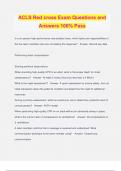
-
ACLS Red cross Exam Questions and Answers 100% Pass
- Exam (elaborations) • 48 pages • 2024
- Available in package deal
-
- $13.49
- + learn more
ACLS Red cross Exam Questions and Answers 100% Pass In a six-person high-performance resuscitation team, which tasks are responsibilities of the five team members who are not leading the response? - Answer- Record key data Performing chest compressions Sharing pertinent observations When providing high-quality CPR to an adult, what is the proper depth for chest compressions? - Answer- At least 2 inches (5cm) but less than 2.4 96cm) What is the rapid assessment? - Answer- A quick assessme...
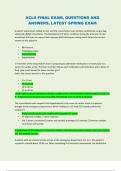
-
ACLS FINAL EXAM, QUESTIONS AND ANSWERS, LATEST SPRING EXAM
- Exam (elaborations) • 15 pages • 2024
-
- $17.99
- + learn more
ACLS FINAL EXAM, QUESTIONS AND ANSWERS, LATEST SPRING EXAM The emergency department team is providing care to a patient who is experiencing ventricular tachycardia. The patient's serum electrolyte levels are a contributing cause of the patient's current condition. Which electrolyte imbalance(s) would most likely be involved? Select all correct options that apply. • Hyperkalemia • Hypochloremia • Hypernatremia • Hypomagnesemia • Hypocalcemia A 30-year-old patient has...
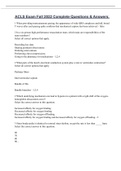
-
ACLS Exam Fall 2022 Complete Questions & Answers.
- Exam (elaborations) • 17 pages • 2022
-
- $8.89
- 1x sold
- + learn more
ACLS Exam Fall 2022 Complete Questions & Answers. When providing transcutaneous pacing, the appearance of wide QRS complexes and tall, broad T waves after each pacing spike confirms that mechanical capture has been achieved. 2 In a six-person high-performance resuscitation team, which tasks are responsibilities of the team members? Select all correct options that apply. Recording key data Sharing pertinent observations Ordering interventions Performing chest compressions Going to ...
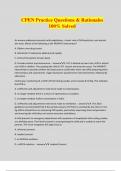
-
CPEN Practice Questions & Rationales 100% Solved
- Exam (elaborations) • 43 pages • 2024
- Available in package deal
-
- $14.49
- + learn more
CPEN Practice Questions & Rationales 100% Solved An anxious adolescent presents with palpitations, a heart rate of 184 beats/min, and normal skin tone. Which of the following is the PRIORITY intervention? A. Obtain urine drug screen. B. Administer IV adenosine (Adenocard) rapidly. C. Instruct the patient to bear down. D. Provide comfort and reassurance. - answerD. SVT is defined as heart rate >220 in infants and >180 in children. Thus putting the child in SVT. Search and treat the ...
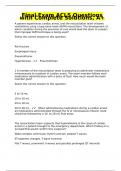
-
Final Exam ACLS Questions with Complete Solutions, A+
- Exam (elaborations) • 20 pages • 2024
-
- $11.99
- + learn more
A patient experiences cardiac arrest, and the resuscitation team initiates ventilations using a bag-valve-mask (BVM) resuscitator. The development of which condition during the provision of care would lead the team to suspect that improper BVM technique is being used? Select the correct answer to this question. Rib fracture Esophageal injury Pneumothorax Hypertension - Pneumothorax 1 A member of the resuscitation team is preparing to administer medications intravenously to a patient...
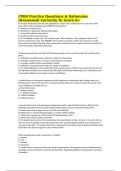
-
CPEN Practice Questions & Rationales (Answered) Correctly To Score A+
- Exam (elaborations) • 30 pages • 2024
-
- $13.50
- + learn more
CPEN Practice Questions & Rationales (Answered) Correctly To Score A+ An anxious adolescent presents with palpitations, a heart rate of 184 beats/min, and normal skin tone. Which of the following is the PRIORITY intervention? A. Obtain urine drug screen. B. Administer IV adenosine (Adenocard) rapidly. C. Instruct the patient to bear down. D. Provide comfort and reassurance. D. SVT is defined as heart rate >220 in infants and >180 in children. Thus putting the child in SVT. Search and...
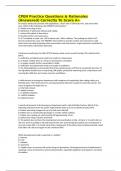
-
CPEN Practice Questions & Rationales (Answered) Correctly To Score A+
- Exam (elaborations) • 30 pages • 2024
- Available in package deal
-
- $23.00
- + learn more
CPEN Practice Questions & Rationales (Answered) Correctly To Score A+ An anxious adolescent presents with palpitations, a heart rate of 184 beats/min, and normal skin tone. Which of the following is the PRIORITY intervention? A. Obtain urine drug screen. B. Administer IV adenosine (Adenocard) rapidly. C. Instruct the patient to bear down. D. Provide comfort and reassurance. D. SVT is defined as heart rate >220 in infants and >180 in children. Thus putting the child in SVT. Search and...
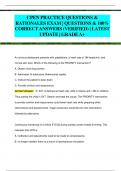
-
CPEN PRACTICE QUESTIONS & RATIONALES EXAM | QUESTIONS & 100% CORRECT ANSWERS (VERIFIED) | LATEST UPDATE | GRADEA+
- Exam (elaborations) • 73 pages • 2024
-
- $12.99
- + learn more
CPEN PRACTICE QUESTIONS & RATIONALES EXAM | QUESTIONS & 100% CORRECT ANSWERS (VERIFIED) | LATEST UPDATE | GRADEA+ An anxious adolescent presents with palpitations, a heart rate of 184 beats/min, and normal skin tone. Which of the following is the PRIORITY intervention? A. Obtain urine drug screen. B. Administer IV adenosine (Adenocard) rapidly. C. Instruct the patient to bear down. D. Provide comfort and reassurance. Correct Answer: D. SVT is defined as heart rate >220 in infan...
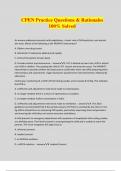
-
CPEN Practice Questions & Rationales 100% Solved
- Exam (elaborations) • 43 pages • 2024
- Available in package deal
-
- $14.49
- + learn more
CPEN Practice Questions & Rationales 100% Solved An anxious adolescent presents with palpitations, a heart rate of 184 beats/min, and normal skin tone. Which of the following is the PRIORITY intervention? A. Obtain urine drug screen. B. Administer IV adenosine (Adenocard) rapidly. C. Instruct the patient to bear down. D. Provide comfort and reassurance. - answerD. SVT is defined as heart rate >220 in infants and >180 in children. Thus putting the child in SVT. Search and treat the ...
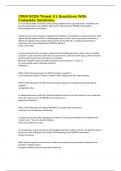
-
CPEN BCEN Timed #1 Questions With Complete Solutions.
- Exam (elaborations) • 14 pages • 2024
- Available in package deal
-
- $14.00
- + learn more
CPEN BCEN Timed #1 Questions With Complete Solutions. A 1-year-old presents unconscious and is being ventilated with a bag-mask device. Ventilation has become progressively more difficult. Which of the following is the PRIORITY intervention? Place padding under the shoulders. A patient arrives to the emergency department intubated and ventilated via a bag-mask device. EMS reports that the patient fell from a climbing apparatus at school. Upon assessment, the patient is difficult to ventil...

Do you wonder why so many students wear nice clothes, have money to spare and enjoy tons of free time? Well, they sell on Stuvia! Imagine your study notes being downloaded a dozen times for $15 each. Every. Single. Day. Discover all about earning on Stuvia


